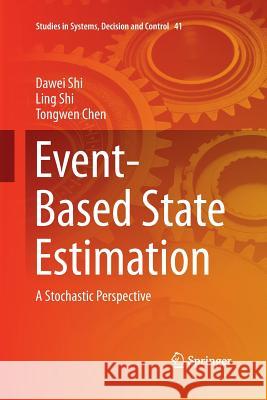Event-Based State Estimation: A Stochastic Perspective » książka



Event-Based State Estimation: A Stochastic Perspective
ISBN-13: 9783319369112 / Angielski / Miękka / 2016 / 208 str.
Event-Based State Estimation: A Stochastic Perspective
ISBN-13: 9783319369112 / Angielski / Miękka / 2016 / 208 str.
(netto: 383,36 VAT: 5%)
Najniższa cena z 30 dni: 385,52
ok. 16-18 dni roboczych.
Darmowa dostawa!
This book explores event-based estimation problems.
"This book addresses essentially the engineers (or researchers and students interested in the area of event-trigged systems). The subject turns around event-based estimation problems in a stochastic setting. This document is self-contained and it is readable with just a basic knowledge of probability theory, Kalman filtering theory, and linear algebra. ... This book is clear and well written. The results presented are proven, and each chapter contains notes and references." (Bénédicte Puig, zbMATH 1331.62010, 2016)
Introduction.- Linear Gaussian Systems and Event-Based State Estimation.- Event-Triggered Sampling.- Approximate Optimal Filtering Approaches.- Constrained Optimization Approach.- Set-Valued Filtering Approach.- Probabilistic Approach.- Communications Rate Analysis.- Open Problems.- Appendices: Brief Review of Probability Theory; Linear Estimation Theory.
Ling Shi received his B.S. degree in Electrical and Electronic Engineering from the Hong Kong University of Science and Technology in 2002 and Ph.D. degree in Control and Dynamical Systems from California Institute of Technology in 2008. He is currently an Associate Professor in the Department of Electronic and Computer Engineering at the Hong Kong University of Science and Technology. His research interests include modeling and control of cyber-physical systems, and sensor data scheduling and sensor fusion. He has published over 30 journals papers and 60 conference papers. He is a member of the IFAC Technical Committee on Networked Systems since Oct 2011, and served in many conference editorial boards including the 2013, 2014, and 2015 European Control Conference. He currently serves as the secretary and treasurer of the Hong Kong Automatic Control Association for the term 2014-2017.
Tongwen Chen is presently a Professor of Electrical and Computer Engineering at the University of Alberta, Edmonton, Canada. He received the B.Eng. degree in Automation and Instrumentation from Tsinghua University (Beijing) in 1984, and the M.A.Sc. and Ph.D. degrees in Electrical Engineering from the University of Toronto in 1988 and 1991, respectively. He has worked on several research areas related to computer control systems, including sampled-data control, multirate systems, networked control systems, and more recently, event-triggered control, and industrial alarm monitoring. In these areas, he has co-authored over 100 journal publications, a graduate textbook, "Optimal Sampled-Data Control Systems" (Springer, 1995), and a research monograph, "Capturing Connectivity and Causality in Complex Industrial Processes" (SpringerBrief, 2014). Moreover, some of his research results have been applied and implemented in the Canadian industry, yielding better process operation and safety. He has been an Associate Editor for several international journals, including IEEE Transactions on Automatic Control, Automatica, and Systems and Control Letters. He is a Fellow of IEEE, IFAC, as well as Canadian Academy of Engineering.
This book explores event-based estimation problems. It shows how several stochastic approaches are developed to maintain estimation performance when sensors perform their updates at slower rates only when needed.
The self-contained presentation makes this book suitable for readers with no more than a basic knowledge of probability analysis, matrix algebra and linear systems. The introduction and literature review provide information, while the main content deals with estimation problems from four distinct angles in a stochastic setting, using numerous illustrative examples and comparisons. The text elucidates both theoretical developments and their applications, and is rounded out by a review of open problems.
This book is a valuable resource for researchers and students who wish to expand their knowledge and work in the area of event-triggered systems. At the same time, engineers and practitioners in industrial process control will benefit from the event-triggering technique that reduces communication costs and improves energy efficiency in wireless automation applications.
1997-2026 DolnySlask.com Agencja Internetowa
KrainaKsiazek.PL - Księgarnia Internetowa









